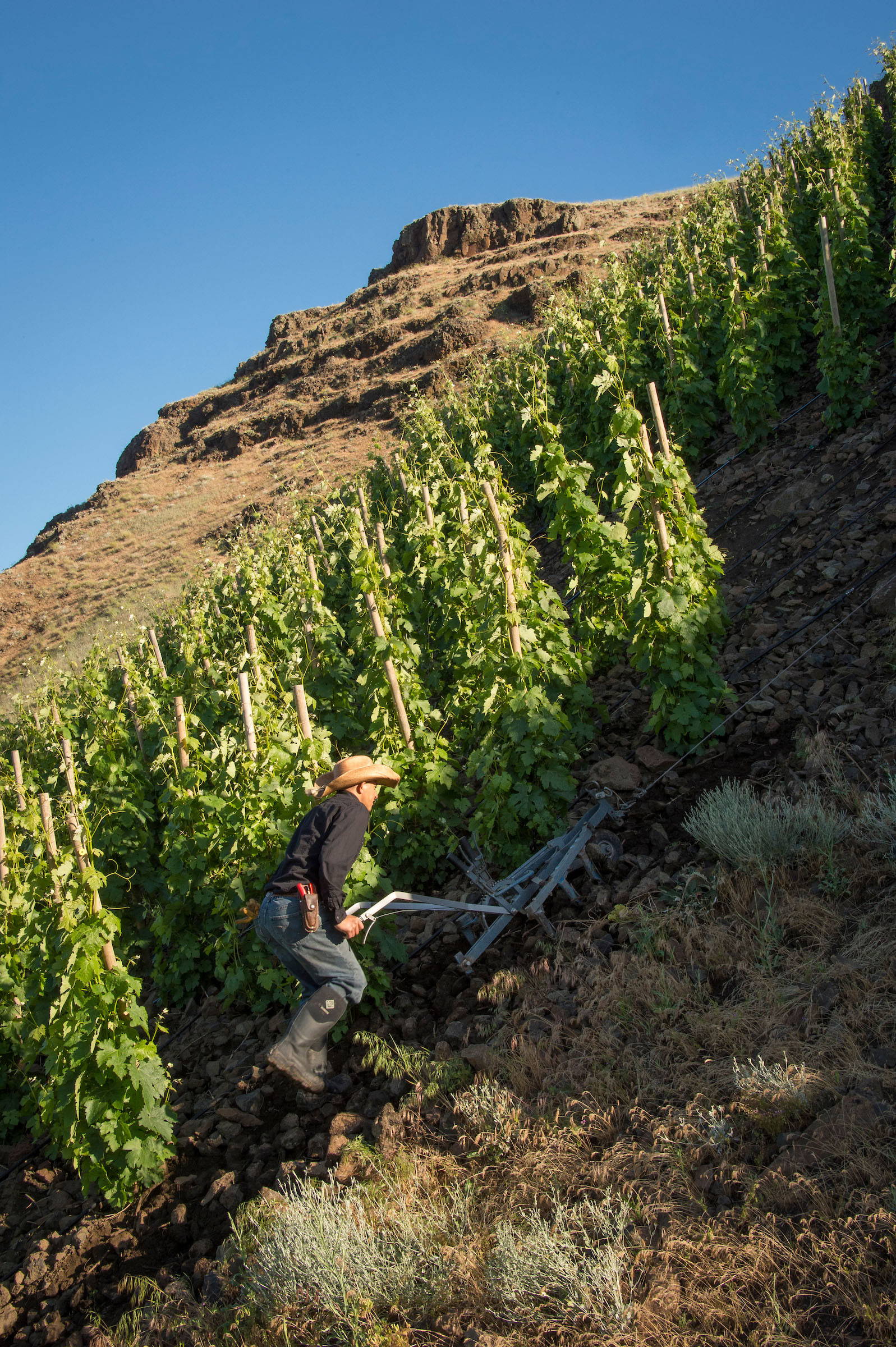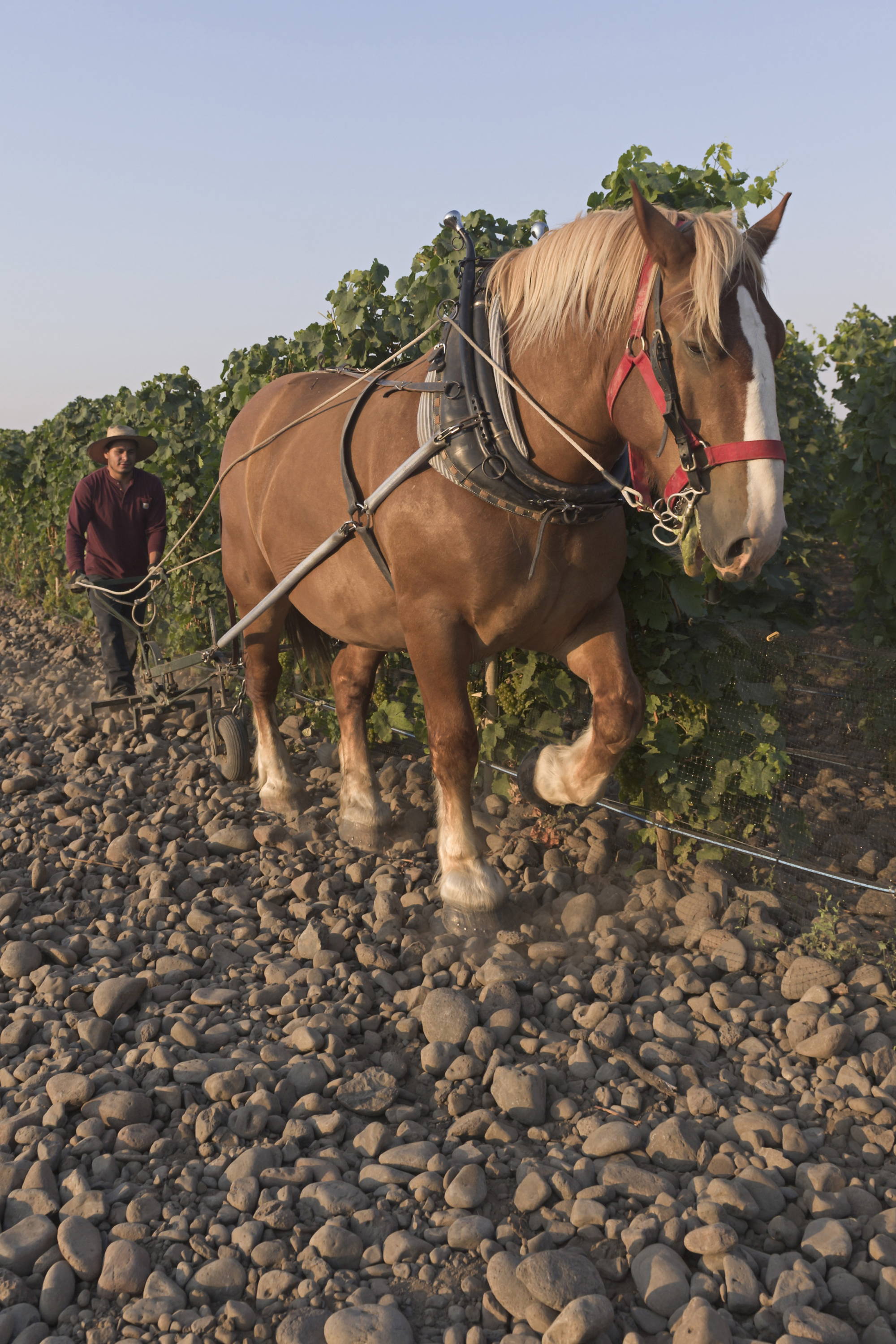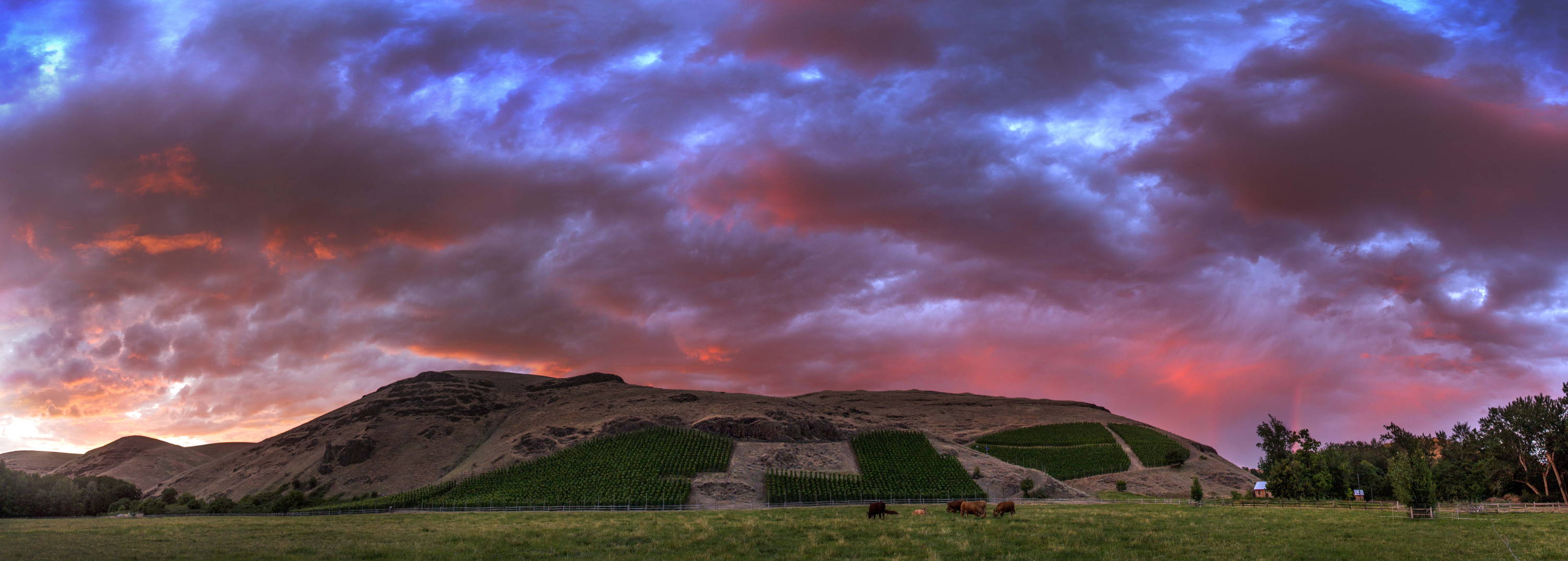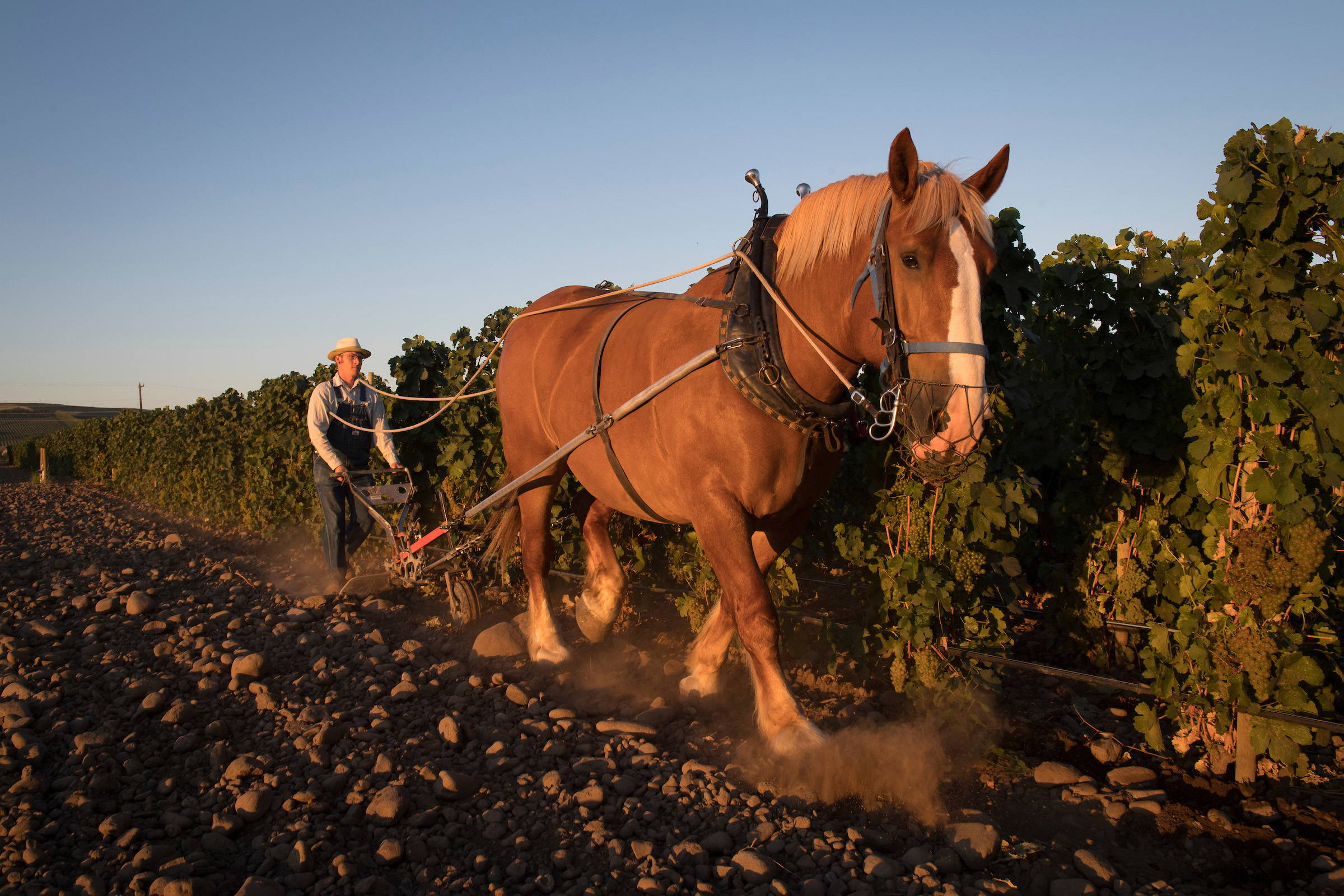CAYUSE WINERY
Christophe Baron
The story began in Champagne (France), where Christophe Baron worked with his father and grandfather at the centuries-old Champagne house, Baron Albert. After studying viticulture in Champagne and Burgundy, Christophe realized he wasn’t yet ready to enter the family business and gave in to the urge to travel. An unexpected winery internship brought Christophe to the Walla Walla Valley for the first time in 1993, which reminded him of Châteauneuf-du-Pape in France. Only four years later, Christophe purchased a property and planted his first vineyard in the Stones of this Valley. He called the venture Cayuse Vineyards, after a Native American tribe whose name was derived from the French word “cailloux”—which means “stones”. Now, Cayuse exploits 5 vineyards.
The story began in Champagne (France), where Christophe Baron worked with his father and grandfather at the centuries-old Champagne house, Baron Albert. After studying viticulture in Champagne and Burgundy, Christophe realized he wasn’t yet ready to enter the family business and gave in to the urge to travel. An unexpected winery internship brought Christophe to the Walla Walla Valley for the first time in 1993, which reminded him of Châteauneuf-du-Pape in France. Only four years later, Christophe purchased a property and planted his first vineyard in this valley's stones. He called the venture Cayuse Vineyards, after a Native American tribe whose name was derived from the French word “cailloux”—which means “stones”. Now, Cayuse exploits five vineyards.
Cayuse
The soil, called “Freewater very cobbly loam,” sits atop 10,000 feet or more of pure basalt—a 15-million-year-old bedrock stratum that’s a part of one of the largest areas of basalt lava on the surface of the earth, outside the ocean basins. Because the stony soil offers excellent drainage and limited nutrients, the vines have to struggle to produce their precious fruit. High-density planting forces their root systems to compete and dig deeper for moisture and sustenance, and the heat transmitted by the stones helps the grapes to ripen.
From the very beginning, Cayuse Vineyards has been farmed organically—without synthetic fertilizers, chemicals, insecticides or fungicides. More recently, in 2002, he became the first Domaine in the Walla Walla Valley to fully implement biodynamic farming. We can find chickens, pigs, sheep and cows, apple and cherry trees, tomato and cucumber vines and rows of corn in these vineyards.
Cayuse
The soil, called “Freewater very cobbly loam,” sits atop 10,000 feet or more of pure basalt—a 15-million-year-old bedrock stratum that’s a part of one of the largest areas of basalt lava on the surface of the earth, outside the ocean basins. Because the stony soil offers excellent drainage and limited nutrients, the vines have to struggle to produce their precious fruit. High density planting forces their root systems to compete and dig deeper for moisture and sustenance, and the heat transmitted by the stones helps the grapes to ripen.
From the very beginning, Cayuse Vineyards has been farmed organically—without synthetic fertilizers, chemicals, insecticides or fungicides. More recently, in 2002, he became the first domaine in the Walla Walla Valley to fully implement biodynamic farming. In these vineyards, we can find chickens, pigs, sheep and cows, apple and cherry trees, tomato and cucumber vines and rows of corn.
Hors Catégorie
In 2005, Christophe discovered the Hors Catégorie vineyard site and created the first vineyard planted on the steep slope along the Walla Walla River's North Fork.
It’s a rare terroir, absolutely unique in America, with a climate, exposure and topography creating an incomparable wine-growing estate. At the convergence of the north fork and the Walla Walla River, the Syrah vines of Hors Catégorie survive in meagre soils of fractured basalt. The high-density planting of 3,555 vines to the acre are staked only 3.5’ x 3.5’ apart.
On this virgin soil, the gradient can be up to 60 degrees, and cultivation can only be done by hand or with machinery winched between the rows. The estate is farmed biodynamically, as all of Christophe Baron’s vineyards are, and in the pasture 150 feet below, cows, goats, sheep, beehives and other wildlife complete the natural ecosystem.


Horsepower
Christophe’s latest project, Horsepower, gets its name from the draft horses that work its vines. Horsepower Vineyards is about tradition and history—and making history. It’s a connection between a vigneron and his roots, a homage to craft and family. It is the first estate in America to be farmed this way exclusively.
Like Cayuse Vineyards, Horsepower is farmed according to an astrological sowing and planting calendar, and entirely without using herbicides, synthetic fertilizers, chemical insecticides or fungicides. Today, six horses, with their teamsters, cultivate tightly spaced 19th century-style vineyards that only they can navigate, using specialized farming equipment created by a blacksmith in Burgundy, France.

Hors Catégorie
In 2005, Christophe discovered the Hors Catégorie vineyard site and created the first vineyard planted on the steep slope along the Walla Walla River's North Fork.
It’s a rare terroir, absolutely unique in America, with a climate, exposure and topography creating an incomparable wine-growing estate. At the convergence of the north fork and the Walla Walla River, the Syrah vines of Hors Catégorie survive in meagre soils of fractured basalt. The high-density planting of 3,555 vines to the acre are staked only 3.5’ x 3.5’ apart.
On this virgin soil, the gradient can be up to 60 degrees, and cultivation can only be done by hand or with machinery winched between the rows. The estate is farmed biodynamically, as all of Christophe Baron’s vineyards are, and in the pasture 150 feet below, cows, goats, sheep, beehives and other wildlife complete the natural ecosystem.

Horsepower
Christophe’s latest project, Horsepower, gets its name from the draft horses that work its vines. Horsepower Vineyards is about tradition and history—and making history. It’s a connection between a vigneron and his roots, a homage to craft and family. It is the first estate in America to be farmed this way exclusively.
Like Cayuse Vineyards, Horsepower is farmed according to an astrological sowing and planting calendar, and entirely without using herbicides, synthetic fertilizers, chemical insecticides or fungicides. Today, six horses, with their teamsters, cultivate tightly spaced 19th century-style vineyards that only they can navigate, using specialized farming equipment created by a blacksmith in Burgundy, France.
REGION OF PRODUCTION
Washington - USA
APPELLATION
-
FOUNDED
1997
VINEYARD
Cayuse: 19 hectares
Hors Catégorie: 1 hectare
Horsepower: 4.5 hectares
CLIMATE
Dry and hot climate, with cool nights
SOIL COMPOSITION
Basalt
VARIETIES GROWN
Syrah, Cabernet Franc, Cabernet Sauvignon, Grenache, Merlot, Tempranillo and Viognier
AGRICULTURE
Organic & Biodynamic































